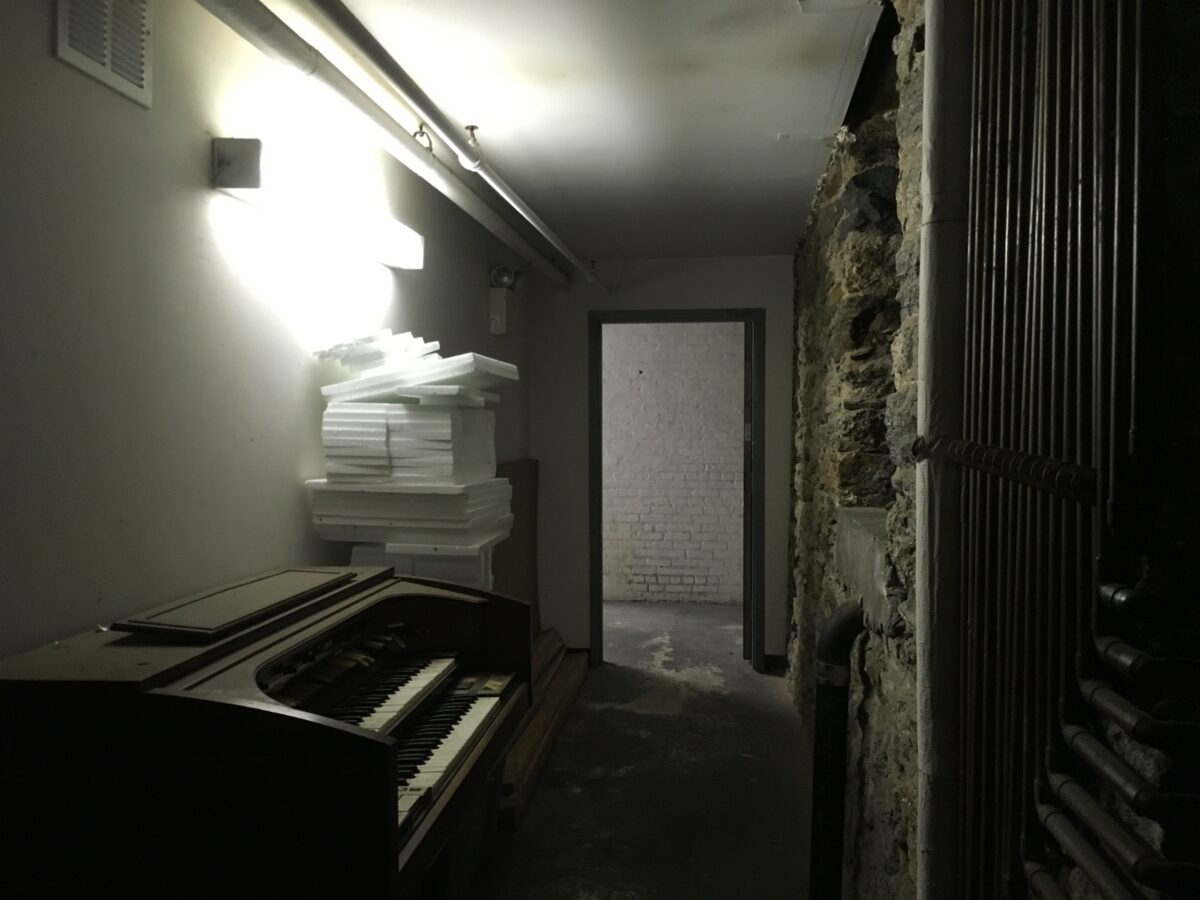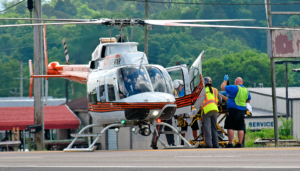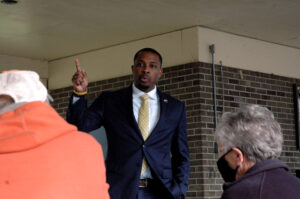You might have seen their ad in The Smoky Mountain Trader, but if you have never stopped by the I-81 Flea Market on a weekend then you are not only missing the best prices available on goods in Hamblen County, you may have overlooked a cultural mainstay of eastern Tennessee.
The I-81 Flea Market – open from the first Saturday in March, through the last weekend of November – is half a mile north along 25 E, from Exit 8 off I-81. Vendors can expect to rent a table for seven dollars a day, and buyers can expect to find all manner of goods, including antiques, food, tools, home appliances, decorative goods, clothing, jewelry, homemade blankets and dresses, and everything in between.
Mary Knight started the I-81 Flea Market in 1981 with her late husband Don L. Knight and their business partner, Tommy Horner. For 40 years, hundreds of people have walked the grounds each weekend. On its busiest days, the flea market could see upwards of 1,000 people.
“I enjoy people, and some of the nicest people in the world are right here,” Knight said. “Really and truly they are. That’s what I like about this market. Everybody’s kindly on the same ball field, and they look out for each other.”
A central theme of her management style, Knight said she does not allow anything to interfere with the enjoyment of the youngest and oldest age groups who visit the flea market. She categorizes herself somewhere in the middle.
“I figure the ones in between, like myself, we can take care of it,” she said. “I figure we can handle whatever comes up, but you got to take care of those two groups.”
She describes the flea market as a family-oriented place. On a sunny weekend, there are dozens of children from all backgrounds running around in the grass, playing together, and helping their families.
“Got a lot of kids here,” she said. “Got a lot of older people here, where this is their social life.”
On a cold, rainy Saturday morning in November, just before sunrise, one finds a group of men under the first covered shed, preparing for the sale, talking, laughing, making early trades, and carrying on with each other. On this particular morning, rain was making life difficult, but the die-hards were already out working that day, setting out goods on their reserved tables, and talking among themselves.
“Where are you going for breakfast?” a bearded man asked his friend, Roy. “Why don’t you ever eat your wife’s breakfast?” he joked, opening the meal she had cooked earlier that morning and sent for him and his son, but not Roy.
“Roy eats at Hardee’s,” someone said back. “He likes their country ham.”
“That salty country ham sure is good, but you’ve got to watch your blood pressure,” the bearded man advised, pointing at Roy for emphasis.
His name is T.J. Noah, and he has been in the trade since 1977. Knight says T.J. and his son Thomas have been selling merchandise every weekend at the flea market for the past several years. They are often the earliest vendors to open on Saturdays, and even show up in the rain, on days like today, selling name brand foods, snacks, cookies and drinks. A pack of soft cookies that sells for $4 in stores, for example, T.J. offers at his table for just 50 cents. Chips can go for a quarter a piece. Even his bottled drinks are not expensive, but the stories are free.
In the late ‘70s T.J. said he first got into business running his own auctions.
“Remember I used to have that sign on my door?” T.J. asked of his nearby friends. “‘T.J.’s way or the highway?’ Remember I told that woman don’t let the door hit you on the ass?”
Everyone laughed who already knows the story.
He said even though he was the one holding the microphone to a PA system, a woman had been talking over him, and disrupting the sale, which he ran out of a building at his home in Tazewell.
“You couldn’t auction for that woman squalling, and going on,” T.J. said. “I told her to shut up. She said ‘I’ve been throwed out of better places than this.’ I said, ‘Don’t let the door hit you on the ass when you leave.’ Said it over the microphone. ‘Probably a bar room, what you’ve been thrown out of.’”
T.J. noticed that other people began listening to his story, drawing closer to the van to hear what’s so funny. He went into greater detail.
“I said, ‘You need to shut up so I can have a sale,’ you know?” he said. “That building I sold out of, every little noise – wasn’t it Roy – was louder?”
Roy nodded in agreement, although he was not there at the time.
“In the basement of my building, it just echoed in there,” T.J. said. “You could whisper in the back, and I could hear it up there. She was cackling, going on, and telling jokes or something. I said, ‘You need to quieten down a little bit.’ She started running that mouth. I said, ‘Don’t let the door hit you in the ass on your way out.’ She had me mad. You couldn’t embarrass this woman. No shame. She’s dead now. Her and her husband used to play Mr. and Mrs. Santa Claus at Walmart over there. She was one of them kind of women you couldn’t embarrass, you know?”
At this point, most of the group shared another laugh and dispersed. They went about setting up their own tables, exchanging remarks about the miserable weather, and seeing what the others had for sale.
T.J. continued his story. He said in a six-month period, his computer and accounts had been hacked eight times and he does not feel comfortable putting his finances online.
“They took our auctioneer license because we didn’t renew them on the computer,” he said. “We’ve been hacked and everything. You think I’m going to put any money out there on the line? State took it. If I decided to have one, I’d still have one. State can kiss my ass.”
Here, however, was another story. Showing greater deference to Mary Knight in the office, T.J. adheres more to her rules than those of the state of Tennessee, or so he said, concluding the conversation.
“At the flea market, it’s Mary’s way or the highway,” T.J. said.
She laughed at the comment. On this patch of land along 25 E, Knight sees that everyone is in compliance with not just her rules, but Tennessee law.
“They pretty much know that out here,” she said. “I don’t put up with a bunch of crap. They can either go by my rules or go somewhere else. They’re not written in stone like the Ten Commandments, and you can kindly bend with some of them – but a lot of them, no I don’t bend – and they know that.”
She said she stays firm on the most important tenets, like staying within the bounds of the law, and keeping the environment safe for children.
“I don’t allow anyone out here drinking,” she said. “I’m not going to have any drugs. None of the pornography on the tables. I just don’t allow none of that stuff. The world today—the kids can probably teach me a lot of stuff, but they’re not going to learn it here.”
Knight said that although every day is different in her business, she does not usually have to reiterate or enforce her rules. It takes a courteous, respectful, and diverse group of people to give her flea market the character and qualities hundreds of people enjoy each weekend.
She knows her vendors as intimately as they might know each other. Gesturing out the window of her office, she begins telling their stories as they file in early, preparing to set up for the coming weekend.
“God love him. I believe that’s that little guy…” She trailed off, watching as he parks his car.
“I really worry about him. Sometimes he comes down here. He’ll stay all night tonight, and he’ll stay, of course, tomorrow. Sometimes he stays Saturday night, and then leaves Sunday,” she said. “But he comes, and sometimes he’s come and had no money, had no food, and the people I was talking about who come in from Kentucky, they normally have got a little hot plate, and they cook on it, and they always fix him something to eat, too. Or different people around buy him something to eat.”
Knight said this, too, is what she loves about her market. Among herself and the vendors, there is a strong sense of community, loyalty, and mutual care.
“Most of the people are good people. If I have any problems it’s the people who are coming in, looking. They’re just here to agitate somebody,” she said. “Just like one old guy out here last year talked pretty rough to one of my female vendors down here, and she called me.”
Knight said she asked the woman if she could still see him, and to identify him. She pointed him out.
“I went down there,” she said, “and he was one of these guys who had the tattoos – I reckon people think those tattoos make them look tough – with the wife beater shirt on. I said, ‘Hey, I need to talk to you.’”
The man said, “Yeah, what do you want?”
Knight said, “Where’s your vehicle?”
He said, “You see that black truck right there?”
“Yeah, I see it,” she said.
“That’s mine.”
“OK. You can either walk to it, and get in it, and leave here, or I’ll drag you up there to it, and put you in it,” she said. “He was about to—I said, ‘Nope, don’t even start running your mouth to me. I’ve done heard from too many people what you said – what you did – so you’re out of here.’”
Knight smiled and said, with a laugh, “I might get whooped, but they’ll know I was there.”
Although she runs a tight operation, and all the sellers agree she keeps her market safe, Knight is no stranger to aggression.
“I had a guy, one day, pulled a knife on me,” she said, “and he said, ‘Give me that money.’ I said, ‘Yeah, I will,’ and I just reached behind my back, and pulled out a gun, put it between his eyes. I said, ‘Boy, you’ve come to a gunfight with a knife. You’re in bad shape.’”
“Oh, Mary, I’m just kidding!”
“I said, ‘I’m not.’”
Everybody out here knows that’s just not going to happen, Knight said, who has carried a gun starting sometime around the age of 12.
The market, with its covered sheds, food truck, and weathered wooden tables, has changed little since it began in 1981.
“I guess age has changed a lot more than anything,” she said. “It used to be an older generation, and now it’s pretty much all ages.”
She said with the shifting of age groups at her flea market, the merchandise has subtly changed.
“You had more of your antique dealers at that time,” she said, adding that most of the people dealing in antiques have died off.
“The younger generation, that means nothing to them,” she said. “All they want is the greenbacks. I see that all the time.”
Antiques can still be found at the I-81 Flea Market, being sold by people like Bob “Chief” Fletcher, who owns a bus at the edge of the property, and sells antique trunks, lamps, lighters, and bric-a-brac.
“We’ve got that bus full,” Chief said, gesturing to an early model tour bus behind him with seafoam green trim, artwork for curtains, and a bathtub out front. “There is no room to put it all out.”
Mary said antiques, such as old clocks or radios, do not always bring enough money, at a large enough scale, to justify their place in markets like hers.
“If you’ve got antiques – good antiques – you’re going to have to hold onto them, or put them in an antique store where they have consignment sales, where you can wait for the right buyer to come through.”
Knight said in the 1980s her vendors were mostly white, but over time shifted to include people of Hispanic origin.
She was told by one of her Hispanic vendors that, “we consider you one of us, because you’ve always taken care of us here.”
Knight responded, “Well, I’ll always take care of you here. Just because you’re Hispanic doesn’t mean somebody’s going to come out here and mess with you.”
She recalled a time in recent history when a hate group calling themselves the Minutemen tried to get started in Hamblen County.
“A lot of people act like they don’t even remember,” she said. “Now I’m like, my God, it’s not been that long ago. They tried to get a real big group started in Hamblen County. How can you not remember it? It was on the front page of the paper.”
Knight said the group had been circulating a newsletter, complete with a list of names of everyone involved in the organization.
“Well, I got the paper, and I told them – I said, ‘Let me tell you something, guys: If your name’s on this paper, right there’s the road. You need to hit it. The Hispanics are welcome here, so let’s get that straight now. You’re not going to come out here and cause trouble,’”
She said the group was attempting to blame the Hispanic population for coming into the county and taking their jobs.
“No, they didn’t take your jobs,” she said. “You’re too sorry to work.”
Knight said she has worked her entire life, beginning with a store owned by her parents, Charlie Hill’s Store. That store was torn down and later moved next to the Housing Authority on Sulphur Springs Road in Morristown, near the Boys & Girls Club.
“Most of the people around there were good people,” she said. “The ones we had the most trouble with were kids from the boys club.”
She said one evening someone came into her store to rob her while her father was sick. She was there by herself, with rollers in her hair, tending the store, when the boy came in armed, threatening to lock her in a walk-in cooler. She had to think fast.
“I’d done put all the knives back, because I’d cleaned the meat counter up, so I couldn’t just reach and grab one of them,” Knight said, “but I thought, ‘I’m not going to be locked up in no walk-in cooler.’ We got into a fight over the gun. Come to find out, he was on probation. [He came] from a good family in town, but you know. When he left, I had his gun.”
Another time, she said she had parked her car out of sight, near a house behind the store. Her parents were aging by then, and not around as much. To a would-be criminal, the place appeared empty.
“Here comes this old boy from across the street with a stocking over his head,” she said, laughing. “Well I just met him at the front door. You talk about running. He was gone!”
Now, as eastern Tennessee has calmed with age, and the perceived lawlessness of the region fades with time, modernity encroaches. The omnipresence of online reviews, remote work, and inklings of gentrification threaten to push Tennessee’s commercial landscape into a cold, glassy and sterile future.
But Knight says she is happy with her flea market, and has no plan to “upgrade” or “improve” the grounds, saying she likes it the way it is, as does Hamblen County, and so does the community.
“This is a flea market,” she emphasizes. “Everything is pretty smooth out here. I can’t ask for more than that.”
The I-81 Flea Market opens its 41st year on March 5, 2022.
This story appeared in Discover Hamblen County magazine.





